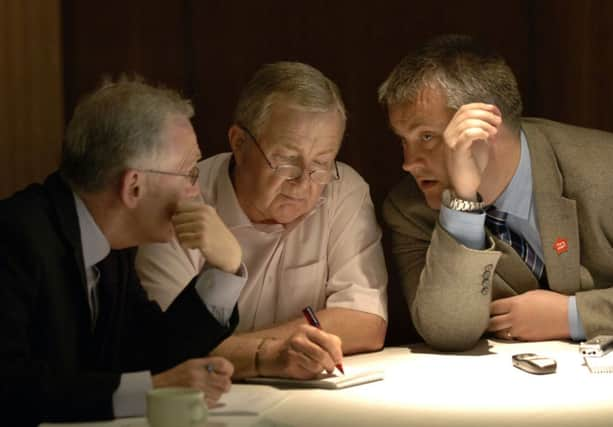Glenn Gibbons’ flair and insight set him apart


Blessed with the technical skills which distinguished the best journalists who learned their trade in the 1960s, his copy also incorporated a contemporary edge thanks to an opinionated streak which, as Sir Alex Ferguson has noted, was born of fearlessness.
In a newspaper career which spanned nearly 50 years, first with D.C. Thomson, then the Scottish Daily Mail before freelancing for the Guardian and the Observer, it was Glenn’s time as football correspondent of The Scotsman which proved the most fulfilling period of his working life on both a personal and professional basis.
Advertisement
Hide AdAdvertisement
Hide AdFollowing in the footsteps at The Scotsman of such iconic predecessors as John Rafferty and Hugh McIlvanney, Glenn brought to the job of football writer the assets of flair, insight and a contacts book so rich in high-profile entries it would cause even the gruffest of editors to reach for the smelling salts.
His friendship with Sir Alex stretched back, of course, to Fergie’s heady years in charge of Aberdeen. While both Scots were smitten by the nuances of the national game, they also shared other passions. Both Glenn and Alex loved film, for example.
When engaged in conversation about cinema, long before Wikipedia was available at the press of a button on a mobile phone, Alex would phone Glenn if he’d forgotten, let’s say, the name of the character played by John Wayne in The Searchers. (“Ethan Edwards”, barked Glenn.)
As his friends can testify, Glenn’s direct perception of the world was not restricted to the content of his columns. He held obdurate views on many subjects but always made judgments only after a broad consideration of the facts. Whether you agreed with him or not, Glenn wrote measured, illuminating prose which made for compulsive reading. Craig Brown, the former Scotland manager, always reckoned Glenn’s match reports were the most knowledgeably observed in the business.
A bustling footballer in his own right who, as a young man, played junior football in Ayrshire and once went on trial to Barnsley, Glenn was largely self-educated. The son of Joe, a drummer in a jazz band who wasn’t around much, Glenn was raised by his mother, Mary Ann, and a stepfather, Eddie, who was an on-course bookmaker.
He passed on the kind of arithmetical skills you don’t learn in school. If, like me, you find the computing of bookies’ odds as impenetrable as the hunt for the Higgs boson, Glenn’s ability to work out in his head the winnings on even the most complicated roll-up bordered on the dark arts.
After leaving school, Glenn worked for a flooring company, but, as his appreciation of language grew through reading the classics, he managed to gain employment writing for the Sunday Post and the Weekly News, where he contributed to Peter Black’s football page. (It wasn’t to be the last pseudonym of his career: when he picked up Rafferty’s mantle at the Guardian, for years his copy was by-lined Patrick Glenn).
Advertisement
Hide AdAdvertisement
Hide AdThis was a golden age for Scottish football and the men who chronicled the game’s success stories. Glenn never tired of remarking how no supporter under the age of 60 could properly appreciate the level at which our clubs competed in the ’60s and ’70s, underlining his point by recalling how, in 1967, the year Celtic won the European Cup, Rangers also reached the final of the Cup Winner’s Cup and Kilmarnock the semi-finals of what is now called the Europa League.
When Alec Young retired from the Scottish Daily Mail in 1975, Glenn joined forces with Brian Scott to form perhaps the most formidable double act in Scottish football writing. He spent 12 years with the Mail before accepting a redundancy package which precipitated a period as a freelance. He became the Guardian’s football man in Scotland after Brian Wilson switched from journalism to politics, also contributed to the Daily Telegraph and eventually came to write a column for The Scotsman. This was so well received it led to the offer of a staff position which Glenn took up at the tail-end of the ’90s.
Glenn and I had been casual friends for a long time. I first got to know him in the ’70s as a novice sportswriter who had succeeded Rafferty and needed all the help I could get. I remember a grand party at his house when Samantha, his daughter, was just a bairn. It was a blessing that Glenn lived long enough to take pride as a grandfather in Samantha, a translator, having a child, Ollie, of her own. His son Michael, not only resembles his father but also inherited Dad’s garrulous nature. Now a senior press officer with the European Tour, Michael is one of the most able of Tour employees, hugely popular with a new generation of elite golfers.
In more recent times, before we both retired from full-time service with The Scotsman in 2009, Glenn would accompany me each summer to The Open.
Eccentrically, we once shared accommodation at the Pontins resort in Southport. What the rest of the happy campers, blue coats and costumed characters made of a brace of veteran scribes, I can’t imagine.
At The Open, he dearly enjoyed meeting up with old friends from Fleet Street in the press tent and also wrote generously about a game he played with great enthusiasm as a member of Cawder golf club, more often than not in the company of “wee Mary” his beloved wife, soulmate and golf partner.
A football writer with something to say who always said it well, Glenn Gibbons will be sorely missed by the national game and by his wide circle of readers who savoured a rare talent.
His passing sounds a requiem for turning scrutiny of Scottish football into popular art.